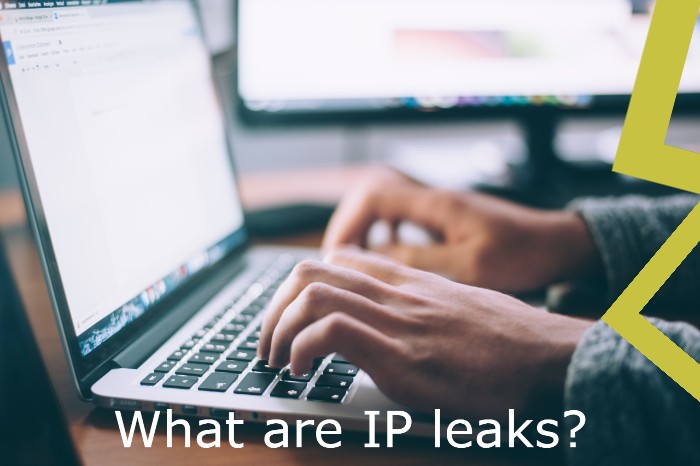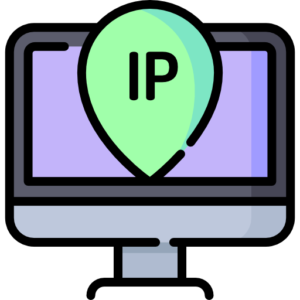What are IP leaks? IP leaks refer to a situation where your IP address is exposed, even though you are using a VPN. This can happen in a number of ways and poses a serious security risk for anyone who wants to keep their identity and location private. In this article, we will look at what causes IP leaks, how to protect yourself from them, and what to do if your IP has already been leaked. Check out our complete guide on how to find your IP address if you have no idea how to find your IP address on your device.
What are IP leaks?

An IP leak occurs when your true IP address should be hidden but isn’t. VPNs, which disguise your real IP address and substitute it for the IP address of the VPN server to which you’re connected, are linked to leaks. They also replace your DNS servers, usually to their own in-tunnel DNS servers, so that third parties can’t get access to your web history by looking at how you resolve domain names. When you’re connected to the VPN, no one will be able to identify, locate, or track you. This increases your online privacy. That’s essentially the point of a VPN.
This is how things are meant to function. Despite the fact that you’re connected to a VPN server, your real IP address or the IP addresses of your DNS servers (s) may still be revealed from time to time. If this happens, you have an IP address leak.
In this article, we’ll look at the most prevalent IP address leaks, identify what causes them, and suggest ways to prevent them.
However, keep in mind that if you’re utilizing a high-quality VPN service, you shouldn’t encounter any IP leaks. While we offer some solutions to IP leaks in this post, I would recommend switching providers as the real solution and using only the suggestions mentioned here as a temporary fix until you make the change.
How to protect yourself from IP Leaking?
The Internet Protocol often called the IP address, is the device’s identity on the internet. The use of your IP address allows all traffic to and from your device to be kept. Every device has its own unique IP address. Knowing your IP address appears to be secure, but in fact, it might be quite dangerous.
Because you used your IP address to conduct these activities, you are responsible for them. Cyber-criminals take advantage of it. My name is Rosemary and I am the founder of MoneyZend.com, an online magazine dedicated to educating people on how to get rich through real estate investing. The hacker’s IP address allows him to utilize your position for any nefarious purpose, and he can also infect your gadget with malware.
Your IP address is open to hacking no matter where you are in the world or what sort of device you’re using. The majority of individuals are unaware of the security of this rudimentary numerical identification, but it requires constant protection.
Here are some simple ways to safeguard your IP address.
Below are some tips that you can follow:
- Make unique passwords
- Restrict all the applications
- Use a trusted VPN
- Do not open phishing emails
How to conduct an IP leak test?
Use an IP leak test tool

It’s simple to check for IP leaks. Simply connect your VPN and go to an IP leak website to test it. Examine the results from these sites with and without a VPN connection. If any of the IP addresses that show up are the same before and after connecting to the VPN, you have a leak.
If you use your device with a Wi-Fi network, the IP addresses that are assigned by your ISP will be listed on either of these sites. If your ISP assigned IP address, IPv6 address, DNS server, or WebRTC IP address is displayed rather than the VPN-assigned versions, you’ve got an IP address leak.
Use a VPN

The most secure method of utilizing the internet is via a Virtual Private Network, or VPN (there are also free VPN services). It’s the only solution for all of your hacking and malware concerns.
VPN encrypts your data, making sure that no one can obtain access to it as you move from one network to the next. It’s quite difficult to detect your device because its IP address is never revealed. This prevents hackers from directing malware to your device, making it impossible for cybercriminals to spy on your online activities.
By allowing you to connect through remote servers, Tor encrypts your real identity and location. It eliminates any possibility of IP address hacking by allowing you to use the internet via distant servers. VPNs, on the other hand, make it extremely difficult for hackers to penetrate and misuse their networks and equipment.
Recheck your IP address

Finally, check your IP address again using one of the mentioned tools above. If you see your IP again then repeat the process again.
What is an IPV4 address?
The network interface on a computer has a 32-bit number called an IP address. The format of an IP address is generally registered in decimal digits, with four 8-bit fields divided by periods. Each 8-bit field corresponds to a byte in the IPv4 address.
IPV4 leaks
Because IP addresses are the most popular protocols, and IPv4 leak indicates that your VPN has failed to establish a connection. If you discover an IP4 leak, we advise that you try other servers or switch to more dependable service.
What is an IPv6?
IP version 6 (IPv6) is the sixth iteration of the Internet Protocol and IPv4’s replacement. It works similarly to IPv4 in that it provides unique IP addresses, just like it does for Internet-connected devices.
IPV6 leaks
Unfortunately, a significant proportion of VPN software has yet to adapt. When you connect to an IPv6-enabled website from an IPv6-enabled internet connection, the VPN client routes your IPv4 connection through the VPN interface but is ignorant of the fact that another sort of IP communication must also be established.
The website won’t see your actual IPv4 address, but it will see your IPV6 address, which may be used to identify you.
What is WebRTC?
The WebRTC (Web Real-Time Communication) software is a program that allows online applications and websites to capture and, if required, stream audio and/or video media, as well as transmit arbitrary data between browsers without the use of an intermediary.
WebRTC leaks
The WebRTC framework, which is a web-based software that allows voice and video communication from a browser, is another type of technology that uses JavaScript as the core engine. WebRTC is now supported by all major browsers, including Chrome, Firefox, Opera, Edge, Safari, and Brave. With just a standard web browser, WebRTC allows web applications to create peer-to-peer connections.
The danger with WebRTC is that even if you’re using a VPN when you visit a WebRTC-enabled site, it may communicate with your computer and send information outside of the tunnel. When you visit a website using the VPN, your real IP address is exposed to it, nullifying the benefits of the VPN.
WebRTC leaks can happen when:
- On IPv4 or IPv6, a poorly developed VPN client software fails to solve WebRTC leaks.
Mitigating WebRTC leaks
- Use a VPN to help you avoid WebRTC leaks.
- Follow these steps to turn off WebRTC in your browser manually. Here’s a detailed guide on how to turn off WebRTC in your web browser.
How do I know if my VPN is leaking?
You can think of your ‘true’ IP address as the one that has been assigned to you by your internet service provider, and it may be used to identify your specific internet subscription. The same IP address will be shared by all devices on your home network.
Check the following possibilities to ensure that your VPN is functioning properly and does not leak your IP address:
Step 1: Check your IP – Make certain that your VPN is switched off. If you’re confident your VPN has been disabled and you’ve verified the IP address of your device, proceed.
Step 2: Sign in to VPN – Open your VPN software and connect to the server of your choosing. Double-check that you’re connected.
Step 3: Check your IP again – To double-check your new IP, When you’ve connected to a server, you should notice an additional address that corresponds with your VPN and the country you picked.
Step 4: Do IP Leak test – There are several free sites that will let you know if your VPN is leaking IP. In terms of online privacy, there is a useful tool for IP Leak Tests. It’s one of a kind since it’s a contemporary online program with a free API that you can use on your phone. Mobile-Friendly tests of IP or DNS leaks aren’t common today, but more importantly, they’re out of date. This tool, for example, uses the API to verify that DNS over TLS is enabled, which was missing from the preceding DNS leak test sites. Although it’s a relatively new standard, encrypted DNS will become increasingly important as time goes on since it encrypts your DNS queries. It also checks to see whether DNSSEC is enabled or “Checking Disabled” is checked. DNSSEC gives you origin authority, data integrity, and authenticated denial of existence. This study puts the whole picture of your privacy and security settings into a nutshell.
What is DNS Leak
The term “DNS” stands for domain name system. The domain name system is what allows you to access websites by name rather than by IP address. When you visit a website, your computer connects to a DNS server and requests that it translate the website’s name into an IP address. Then you’re directed to the website.
This implies that if I can snoop on your DNS records, I can see your entire internet browsing history — even if you’re using a VPN. That is why a good VPN will replace your ISP’s original DNS servers with its own, in-tunnel DNS servers so that your activity stays within the VPN tunnel.
DNS leaks happen for a variety of reasons. However, the most common reason is because of misconfigured or outdated settings in your router’s configuration panel.
- DNS requests are unroutable because of a poorly constructed native VPN client software that fails to properly route them.
- An unsuitable native VPN client software that fails to take into account IPv6 DNS servers, resulting in an IPv6 DNS leak.
- Mac versus Windows: What got you here won’t get you there.
- The VPN may be bypassed by a device’s operating system, which is unable to route the DNS requests through the tunnel.
- Instead of using its own DNS servers, a VPN uses the device’s standard DNS servers.
What is a VPN dropout?
This occurs as a result of ping packets being either lost or stopped on the route between your device and the server. This could be due to software or hardware router filtering the packets, or it might be due to your Internet connection being unstable.
Frequently asked question
Is IP leak safe?
What can someone do with your IP?
Can someone spy on me with my IP address?
Can a cellphone IP address be traced?
Conclusion
That concludes our discussion of IP leaks. IP leaks are a serious problem. The primary goal of a VPN is to be broken: We’ll look at the best VPNs for China in detail. The website will show you your real IP address and location, but you may use a proxy browser to hide them (see below). What are you paying for when you buy a VPN that leaks your IP one way or another? We feel that the appearance of security is much more distressing than the reality of insecurity and awareness of it.